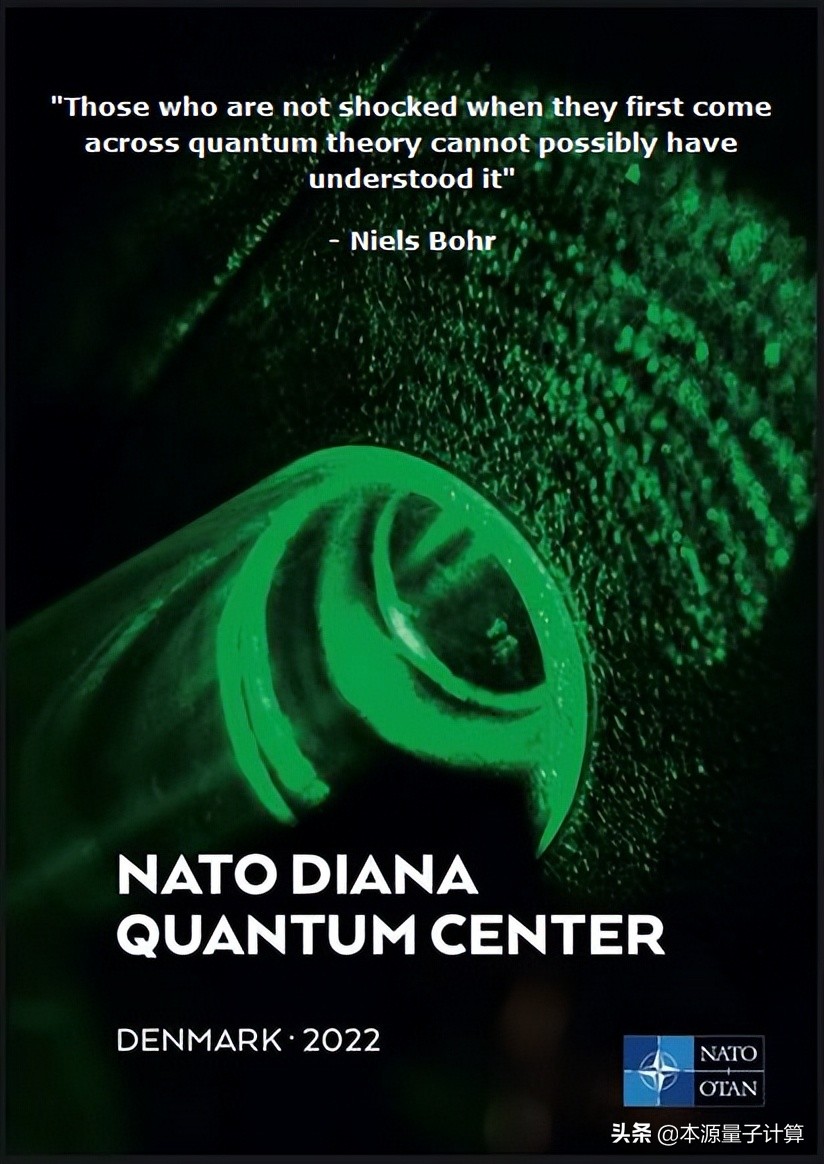NATO will establish a new quantum center in Denmark
On April 6, NATO announced that it would establish a new quantum center in Denmark, which will be part of the Nils Bohr Institute at the University of Copenhagen. At the center, it is planned to create two units that cooperate with the development of quantum technology. The Centre will also contribute to the Technical University of Denmark, Aarhus University and the Danish National Metrology Institute, aiming to develop and test new technologies to accelerate development in the field of defence.

Image credit: Denmark at NATO (Twitter)
Danish Defense Minister Morten Bozkov said the development of quantum technology will bring about major security policy changes for Denmark and NATO. Denmark's contribution to NATO in quantum technology includes two aspects, one is to speed up the training and guidance process to mature the company's technology solutions in the commercial market, and the other is to include a test center and a production unit with physical laboratories and fixed facilities.
Link to the original article: https://tr.sputniknews.com/20220406/nato-danimarkada-kuantum-teknolojisi-icin-yeni-bir-merkez-kuracak-1055350269.html
Japan plans to launch its first domestically produced quantum computer
The Japanese government plans to join the global quantum computing race by putting its first domestically produced quantum computer into use in 2023, and the new strategy includes plans to establish four quantum research centers across the country.
Image source: University of Tokyo
At present, in the development of quantum computing, the United States, China and other other countries are in fierce competition. Quantum computing is expected to have applications in a number of industries, including the development of new drugs and cryptography research tools.
The Japanese government's strategy aims to reach 10 million users of quantum technology by 2030 and create the conditions for its application in a number of fields such as medical treatment, finance and new material improvements.
Original link: https://colorsofindia.media/world/japan/tokyo-proposes-first-domestic-quantum-computer-use-by-march-2023/
Siemens and Pasqal collaborate to advance multiphysics simulation for quantum computing
Quantum computing company Pasqal announced a multi-year research collaboration with Siemens to advance quantum computing research in the field of multiphysics simulation. Siemens is a global leader in computer-aided engineering, and Pasqal's proprietary quantum methods for solving complex nonlinear differential equations are expected to improve the performance of Siemens software solutions for the design and testing of computer-aided products in the automotive, electronics, energy, and aerospace sectors.
Image source: Pasqal
The first phase of the collaboration will last around 3 years and involves researchers from both companies and Pasqal's academic partner, the University of Exeter. The project builds on Pasqal's existing research, including its methods for solving nonlinear differential equations.
Georges-Olivier Reymond, CEO and founder of Pasqal, said, "Our collaboration with Siemens will explore how quantum computing can benefit Siemens customers who are looking for potential applications for quantum computing in automotive, electronics, new energy and more. ”
Original link: https://pasqal.io/2022/04/06/siemens-collaborates-with-pasqal-to-research-quantum-applications-in-computer-aided-engineering-simulation-and-testing/
The State of New Mexico forms the Quantum Alliance
Recently, Sandia National Laboratory, the University of New Mexico and Los Alamos National Laboratory announced the formation of a new consortium, the Quantum New Mexico Alliance (QNM-C), during the New Mexico Quantum Symposium.
Image credit: Sandia National Laboratory
"Quantum technology will one day change the world, and it will lead to high-paying, high-value jobs. New Mexico already has talent capital and world-class research facilities, and we can also make New Mexico a national hub for this high-tech industry," said Rick Muller, Senior Microsystems Manager at Sandia.
Ivan Deutsch, Professor Regents and Director of UNM's Center for Quantum Information and Control, said: "The goal of the Quantum New Mexico Alliance (QNM-C) is to establish a wide range of partnerships in New Mexico, including major research universities, tribal colleges and community colleges, as well as national laboratories and industry. ”
Original link: https://www.hpcwire.com/off-the-wire/quantum-new-mexico-coalition-aims-to-establish-state-as-national-hub/
Silicon qubit fidelity exceeds 99%
Princeton physicists have achieved unprecedented fidelity using dual qubit silicon quantum devices, with experimental tests exceeding 99 percent fidelity, the highest fidelity achieved by dual qubit gates in semiconductors to date, comparable to the best results in the industry. Fidelity is a measure of the ability of qubits to perform error-free operations, and is a key feature in the pursuit of developing practical and efficient quantum computing.
Image credit: Princeton University
This achievement is crucial to the development of quantum computing, and a team led by Jason Petta, a professor of physics at Eugene Higgins at Princeton University, was able to perform this entanglement operation with more than 99.8% fidelity.
In addition to Princeton University, the Australian quantum computing company SQC, the Irish quantum company Equal1, and the Belgian Imec team are all betting on the semiconductor quantum computing route. Then in China, the origin quantum is currently the only engineering team that carries out semiconductor quantum computing research.
Original link: https://phys.org/news/2022-04-quantum-hardware-silicon.html
The United States and Finland sign a joint statement on quantum information technology
On April 5, the United States and Finland signed a joint statement on cooperation in quantum information technology. The signing of the U.S.-Finland Declaration on Quantum Cooperation is an important step towards enhanced cooperation between the two countries in this key emerging technology area. The joint statement will build a strong supply chain for both countries and train future professionals.
Image source: NQCO
In recent years, both countries have vigorously developed quantum information science. The U.S. launched new policies and programs following the National Quantum Initiative in 2018, including 13 centers for quantum information science research, enabling collaborative, multidisciplinary research, and the National Q-12 Education Partnership. Similarly, Finland has a historical advantage in quantum information science and its derived industry areas, such as cryogenics and microwave electronics.
Original link: https://www.quantum.gov/the-united-states-and-finland-move-to-strengthen-cooperation-in-quantum/